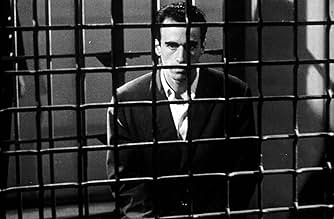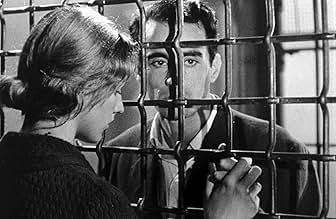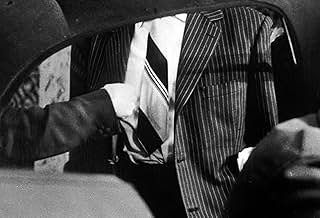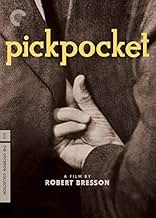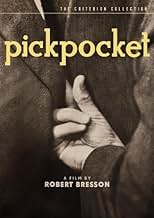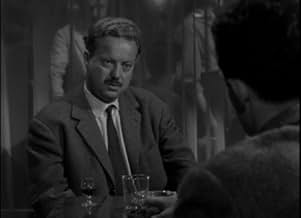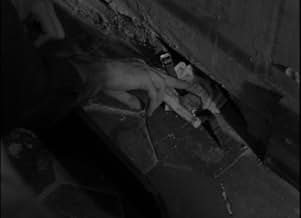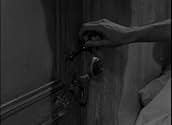Michel passes the time by picking pockets, careful to never be caught despite being watched by the police. His friend Jacques may suspect, while both men may have their eyes on Jeanne, the p... Read allMichel passes the time by picking pockets, careful to never be caught despite being watched by the police. His friend Jacques may suspect, while both men may have their eyes on Jeanne, the pretty neighbor of Michel's ailing mother.Michel passes the time by picking pockets, careful to never be caught despite being watched by the police. His friend Jacques may suspect, while both men may have their eyes on Jeanne, the pretty neighbor of Michel's ailing mother.
- Awards
- 3 nominations total
- Director
- Writer
- All cast & crew
- Production, box office & more at IMDbPro
7.527.1K
1
2
3
4
5
6
7
8
9
10
Featured reviews
The Fall and Redemption of a Pickpocket
In Paris, the lonely and anguished pickpocket Michel (Martin La Salle) lives in a dirty little room and spends his time stealing wallets and purses in public spaces. His only friends are Jacques (Pierre Leymarie), who tries to help him to find a job, and his mother's next door neighbor Jeanne (Marika Green). After the death of his mother, Michel teams-up with two smalltime thieves despite the permanent surveillance of the local police inspector (Jean Pélégri). Later he travels overseas to get rid of the observation of the police, but two years later he returns to Paris and finds Jeanne alone, with her son with Jacques after a brief love affair. Michel decides to help her and find an honest job; but in a horse race, he is tempted by his addiction with tragic consequences.
This is the first time that I have watched"Pickpocket" and I expected much more from this famous movie. The development of the lead character Michel is confused and it is clear that he is a troubled, lonely and anguished unemployed young man, but it is never clear the motives why he is addicted in stealing since he shows no ambition or dream or love. The beauty of Marika Green is impressive and she seems to love Michel since the very beginning but again her feelings are never clear. Indeed the actors and actress express no sentiments and the plot is very weird. My vote is seven.
Title (Brazil): "Pickpocket"
This is the first time that I have watched"Pickpocket" and I expected much more from this famous movie. The development of the lead character Michel is confused and it is clear that he is a troubled, lonely and anguished unemployed young man, but it is never clear the motives why he is addicted in stealing since he shows no ambition or dream or love. The beauty of Marika Green is impressive and she seems to love Michel since the very beginning but again her feelings are never clear. Indeed the actors and actress express no sentiments and the plot is very weird. My vote is seven.
Title (Brazil): "Pickpocket"
Deliberately unconventional approach to filmmaking with great results
Pickpocket is a film that apparently has serious flaws- from the very beginning it displays little to no emotion as the actors on screen just say their lines and the camera just follows them from a distance, with no close-ups or any other tricks.
But what is unique about this film is that this very criticism is actually a deliberate attempt to cause uneasiness in the viewer. And it succeeds- the anxiety, as felt by the pickpocket in his everyday living, is also transmitted to us. So, to correct my previous statement: this movie does not lack emotions- it has emotions: anxiety, uncertainty, but these are delivered in an unconventional manner.
From a personal standpoint, I wasn't sure if I liked it or not. It is hard to appreciate this dimension of the film at first. But after seeing some extras from the excellent Criterion package, I was able to understand better. How Bresson actually committed to cause these emotions in the viewer, how he re-shot several times various scenes until the actors just repeated their lines, until no trait of emotions were left. Michel's narration voice-over is flat, plain. These were non-professional actors set to work in a non-standard way, Bresson's way. And the result is this: a film somewhat off-putting, but still a great work of art.
But what is unique about this film is that this very criticism is actually a deliberate attempt to cause uneasiness in the viewer. And it succeeds- the anxiety, as felt by the pickpocket in his everyday living, is also transmitted to us. So, to correct my previous statement: this movie does not lack emotions- it has emotions: anxiety, uncertainty, but these are delivered in an unconventional manner.
From a personal standpoint, I wasn't sure if I liked it or not. It is hard to appreciate this dimension of the film at first. But after seeing some extras from the excellent Criterion package, I was able to understand better. How Bresson actually committed to cause these emotions in the viewer, how he re-shot several times various scenes until the actors just repeated their lines, until no trait of emotions were left. Michel's narration voice-over is flat, plain. These were non-professional actors set to work in a non-standard way, Bresson's way. And the result is this: a film somewhat off-putting, but still a great work of art.
Best appreciated if you slo-mo the whiz scenes
A remarkable film even though the ending is anti-climactic. An amateur pickpocket gets lucky and meets Kassagi, the real-life pickpocket who served as the film's technical consultant. The most amazing scene is the one where three pickpockets rob one passenger after another on a train, taking wallets, passing them off to each other, then emptying and dumping them (or in one case, neatly replacing the lightened wallet in a man's pocket!). The light-finger techniques seem more or less authentic, although I imagine the director's script might have called for inauthentic bits of business. (No, I am not a pickpocket; I was a mark once, and they really messed up my life for a couple of days, but I have been fascinated ever since.)
The pickpockets in this movie follow the European style of stealing men's wallets practically face-to-face. (American pickpockets traditionally prefer to steal from behind to avoid any chance of a mark seeing their faces. When I was taken, I never saw, heard or felt anything.)
LaSalle as Michel is deadpan, but that seems to be part of his character. Now and again, he bubbles a little with suppressed feeling, mostly anger. His passion for Jeanne (Marika Green) is so completely submerged that it does not come out until the end. (If you think I'm spoiling anything, you will want to skip the on screen legend that opens the film because it gives away even more.) As a love story, this does not work. I get it, though: Something happened before the film begins that makes Michel extremely ashamed. He can't be with his mother or anyone he cares about because of his guilt.
The pickpockets in this movie follow the European style of stealing men's wallets practically face-to-face. (American pickpockets traditionally prefer to steal from behind to avoid any chance of a mark seeing their faces. When I was taken, I never saw, heard or felt anything.)
LaSalle as Michel is deadpan, but that seems to be part of his character. Now and again, he bubbles a little with suppressed feeling, mostly anger. His passion for Jeanne (Marika Green) is so completely submerged that it does not come out until the end. (If you think I'm spoiling anything, you will want to skip the on screen legend that opens the film because it gives away even more.) As a love story, this does not work. I get it, though: Something happened before the film begins that makes Michel extremely ashamed. He can't be with his mother or anyone he cares about because of his guilt.
Comic relief in an otherwise humorless film
To my previous comments, I should like to add/correct. When I said that Kassagi, who plays "first accomplice" (1er complice), was a 'real-life pickpocket who served as the film's technical consultant' I was not only inaccurate, but the fact that Kassagi was actually a stage magician has some bearing on the film itself, for although the scene in which the pickpockets rip off a series of train passengers is authentic in that it shows how pickpockets operate in terms of teamwork and speed, nevertheless, the moment when Kassagi (?) 'neatly replac[es] the lightened wallet [back] in a man's pocket' is not something a real pickpocket would likely do; it is, however, exactly what a stage magician would do. A real pickpocket has no audience (or so he hopes) whereas a magician wants the audience to see him make a monkey of the hapless "volunteer from the audience." In this case, Kassagi's idea (as I am sure it was) provides a brief moment of comic relief in the middle of a movie that is otherwise without a lot of humor. It is a welcome touch and Bresson was wise to keep it in. Now, I also engaged in a fallacy when I said that 'American pickpockets traditionally prefer to steal from behind to avoid any chance of a mark seeing their faces.' In reality, American pickpockets take from behind because of necessity: even by 1959 when 'Pickpocket" was released, American men more and more carried their wallets in the hip pocket whereas European men, as can be seen in this film, continued to use the inside breast pocket. While the business about seeing the mark's face is part of the lore of American petty criminals, it is not the cause of the American style of picking pockets, but rather a rationalization after the fact.
Bresson's films are quite unlike anything else in the cinema...
In his dismissal determination to keep out elements often thought fundamental to the mediumspectacle, drama, performance Bresson has followed an incomparable personal vision of the world that stays consistent whatever the nature of his subject matter...
In "Pickpocket," a petty thief understands life's mystery only when his conventional wisdom is violently shaken and embraces humanity through his newfound love Most notable, however, is not the emphasis upon redemption attained through communication and self-sacrifice, but the high-purity of Bresson's style...
The camera keeps out pictorial beauty to create an abstract timeless world through the detached, detailed observation of hands, faces, and objects; natural sounds rather than music to satisfy the need In thus rejecting conventional realism and characterization, Bresson manifested a fascination not with human psychology but with the capacity of the soul to survive in a world of pain, disbelieve, and restriction...
In "Pickpocket," a petty thief understands life's mystery only when his conventional wisdom is violently shaken and embraces humanity through his newfound love Most notable, however, is not the emphasis upon redemption attained through communication and self-sacrifice, but the high-purity of Bresson's style...
The camera keeps out pictorial beauty to create an abstract timeless world through the detached, detailed observation of hands, faces, and objects; natural sounds rather than music to satisfy the need In thus rejecting conventional realism and characterization, Bresson manifested a fascination not with human psychology but with the capacity of the soul to survive in a world of pain, disbelieve, and restriction...
Did you know
- TriviaBanned in Finland until 1965 because of its depiction of authentic pickpocketing techniques.
- ConnectionsEdited into Histoire(s) du cinéma: Une histoire seule (1989)
- SoundtracksSuite de symphonies d'Amadis (selection)
(uncredited)
Music by Jean-Baptiste Lully (as J.B. Lulli)
Éditions Transatlantiques
- How long is Pickpocket?Powered by Alexa
Details
Box office
- Gross worldwide
- $7,541
- Runtime
- 1h 16m(76 min)
- Color
- Aspect ratio
- 1.37 : 1
Contribute to this page
Suggest an edit or add missing content


